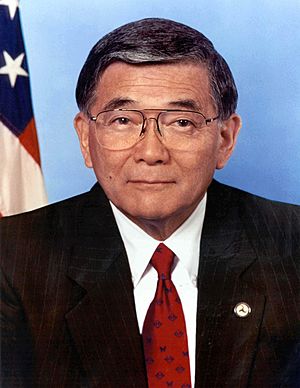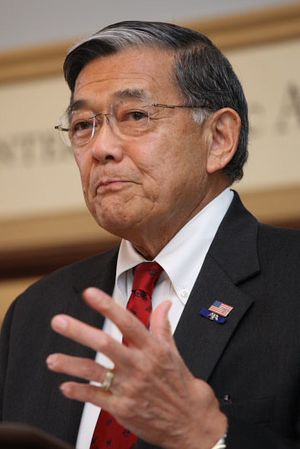Norman Mineta facts for kids
Quick facts for kids
Norm Mineta
|
|
|---|---|
 |
|
| 14th United States Secretary of Transportation | |
| In office January 25, 2001 – July 7, 2006 |
|
| President | George W. Bush |
| Preceded by | Rodney Slater |
| Succeeded by | Mary Peters |
| 33rd United States Secretary of Commerce | |
| In office July 20, 2000 – January 20, 2001 |
|
| President | Bill Clinton |
| Preceded by | Bill Daley |
| Succeeded by | Donald Evans |
| Ranking Member of the House Transportation Committee | |
| In office January 3, 1995 – October 10, 1995 |
|
| Preceded by | Bud Shuster |
| Succeeded by | Jim Oberstar |
| Chair of the House Transportation Committee | |
| In office January 3, 1993 – January 3, 1995 |
|
| Preceded by | Bob Roe |
| Succeeded by | Bud Shuster |
| Member of the U.S. House of Representatives from California |
|
| In office January 3, 1975 – October 10, 1995 |
|
| Preceded by | Bob Lagomarsino (redistricted) |
| Succeeded by | Tom Campbell |
| Constituency | 13th district (1975–1993) 15th district (1993–1995) |
| 59th Mayor of San Jose | |
| In office January 9, 1971 – January 9, 1975 |
|
| Preceded by | Ron James |
| Succeeded by | Janet Hayes |
| Personal details | |
| Born |
Norman Yoshio Mineta
November 12, 1931 San Jose, California, U.S. |
| Died | May 3, 2022 (aged 90) Edgewater, Maryland, U.S. |
| Political party | Democratic |
| Spouses |
May Hinoki
(m. 1961; div. 1986)Deni Brantner
(m. 1991) |
| Children | 4 |
| Education | University of California, Berkeley (BS) |
| Military service | |
| Allegiance | |
| Branch/service | |
| Unit | |
Norman Yoshio Mineta (born November 12, 1931 – died May 3, 2022) was an American politician. He was a member of the Democratic Party. Mineta served in President George W. Bush's team as the United States Secretary of Transportation. He was the only Democrat in Bush's team. During his time as Transportation Secretary, Mineta helped create the Transportation Security Administration (TSA). This happened after the September 11 attacks.
Before that, he was the United States Secretary of Commerce for the last few months of Bill Clinton's presidency. He was the first person of East Asian background to be a U.S. Cabinet Secretary. Mineta was also a member of the United States House of Representatives for California from 1975 to 1995. He was also the Mayor of San Jose from 1971 to 1975.
On June 23, 2006, Mineta announced he would leave his job as Secretary of Transportation. He left on July 7, 2006. This made him the longest-serving Transportation Secretary ever. After leaving, he joined a public relations company and later a coal energy company.
Contents
Early Life and Education
Mineta was born in San Jose, California. His parents were immigrants from Japan. At that time, they could not become U.S. citizens. During World War II, Mineta's family was sent to an internment camp called Heart Mountain in Wyoming. Thousands of other Japanese immigrants and Japanese Americans were also held there.
When he arrived at the camp, Mineta's baseball bat was taken away. Authorities thought it could be used as a weapon. Years later, when Mineta was in Congress, someone sent him a valuable baseball bat. He had to send it back because of rules about gifts. He joked, "The government's taken my bat again."
While in the camp, Mineta was a Boy Scout. He met another Scout, Alan K. Simpson, who later became a U.S. Senator. They became close friends for life.
Mineta graduated from the University of California, Berkeley in 1953. He studied business. After college, he joined the U.S. Army. He worked as an intelligence officer in Japan and Korea. Later, he worked with his father in an insurance business.
Political Career
Serving San Jose as Councilman and Mayor
In 1967, Mineta was chosen to fill an empty spot on the San Jose City Council. He was then elected to the council. His fellow council members later chose him to be vice mayor.
In 1971, Mineta ran for mayor of San Jose against 14 other people. He won with more than 60% of the votes. He became the 59th Mayor of San Jose. He was the first Japanese-American mayor of a large U.S. city. As mayor, he changed the city's plan for fast growth. He created areas where new buildings were not allowed.
Representing California in Congress
In 1974, Mineta was elected to the United States House of Representatives. He represented a part of California that included Silicon Valley. He was reelected 10 more times.
Mineta helped start the Congressional Asian Pacific American Caucus. He was its first leader. He also led the United States House Committee on Transportation and Infrastructure from 1992 to 1994.
While in Congress, he helped write an important law called the Intermodal Surface Transportation Efficiency Act of 1991. This law improved transportation across the country. He also worked to get more money for the Federal Aviation Administration (FAA). Mineta and other lawmakers also pushed for the Civil Liberties Act of 1988. This law apologized for and paid money to Japanese Americans who were unfairly held in internment camps during World War II.
Joining the President's Cabinet
After leaving Congress in 1995, Mineta worked for Lockheed Martin, a large aerospace company. In 2000, President Bill Clinton chose him to be the U.S. Secretary of Commerce. This made him the first Asian American to be in a president's cabinet.
In 2001, President George W. Bush asked Mineta to be the United States Secretary of Transportation. Mineta was the only Democrat in President Bush's cabinet. He was also the first Secretary of Transportation who had already served in another cabinet job. He was the first Asian American to hold this position.
Mineta stayed in this job until June 2006. He was the longest-serving Secretary of Transportation since the job was created in 1967.
Responding to the September 11 Attacks
On September 11, 2001, Mineta was the Secretary of Transportation. He was in a special emergency center with Vice President Cheney when the attacks happened. He helped manage the response to the attacks.
Mineta ordered all planes in the air to land immediately. This was a huge and important decision. At the time, there were over 4,500 planes flying. This order helped make the skies safe. After hearing Mineta's orders, Canada also grounded all civilian aircraft. This was called Operation Yellow Ribbon.
Mineta also made sure that airlines did not treat passengers unfairly based on their background or religion. He said it was against the law to discriminate against people from the Middle East or Muslims. He believed in treating everyone equally, based on his own experience in the internment camps.
The Norman Y. Mineta San Jose International Airport in San Jose was named after him in 2001. The Mineta Transportation Institute at San Jose State University is also named in his honor.
Life After Government Service
After leaving the Bush administration in 2006, Mineta joined a company called Hill & Knowlton. He became a vice chairman there.
Mineta received many awards for his work. In 2005, he got the Golden Plate Award. In 2006, he won the Wright Brothers Memorial Trophy. Also in 2006, he received the Presidential Medal of Freedom, which is one of the highest honors a U.S. civilian can receive. In 2007, the Japanese government gave him a high honor called the Grand Cordon, Order of the Rising Sun.
In 2008, Mineta supported Barack Obama for president. He also worked on a study about how to improve the United States Coast Guard. In 2010, he became co-chair of the Joint Ocean Commission Initiative. He also became Vice Chairman of L&L Energy, a company involved in coal production in China.
Personal Life
Norman Mineta was married twice. His first marriage was to May Hinoki from 1961 to 1986. In 1991, he married Deni Brantner. Mineta had two children from his first marriage and two stepchildren from his second marriage. He also had eleven grandchildren.
Mineta passed away on May 3, 2022, at the age of 90, due to a heart problem.
 | Audre Lorde |
 | John Berry Meachum |
 | Ferdinand Lee Barnett |


